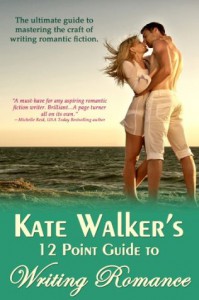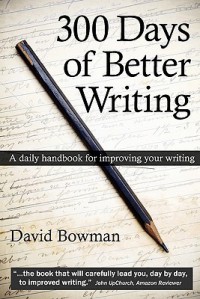321
Followers
28
Following
Book Clever
Mostly just my books, but also some reviews (they might contain spoilers, they're imported from GR and don't parse).
I'm an avid reader of all types, but be warned that I mostly enjoy: horror, sci-fi, fantasy, romances and M/M erotica.
Shift Omnibus Edition (Silo, #2)
 I wasn't as interested in the past of Silos 18 and 17 during Shifts 2 and 3, which is what ended up taking up a star from the final rating. I ended up half skipping those parts (and perhaps missing something). The story is also getting a little too convoluted and... pointless. But it's still an easy, fun read.
I wasn't as interested in the past of Silos 18 and 17 during Shifts 2 and 3, which is what ended up taking up a star from the final rating. I ended up half skipping those parts (and perhaps missing something). The story is also getting a little too convoluted and... pointless. But it's still an easy, fun read.
Writing the Paranormal Novel: Techniques and Exercises for Weaving Supernatural Elements Into Your Story.
 Interesting book.
Interesting book. Had plenty of common sense advice, though, so I suppose it'd be good for newbies to writing and to the genre.
Liked the checklists, the exercises were interesting.
Just about the only thing I didn't agree with was the using social networks advice and the part that said that using the internet "couldn't hurt" (uh, yes it can: become one of those writers who lash out at negative criticism on your book and it'll hurt you. :P)
Also liked when it went on the part of research and interviewing people, because most books I've read so far didn't touch the interviewing part so much, while this one did.
Hooked: Write Fiction That Grabs Readers at Page One & Never Lets Them Go
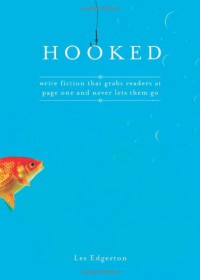 Quite frankly I don't get the reviews this book got. Yes, I put it under "abandoned" books, but not because I fully dropped it, rather because I didn't read it in it's entirety and instead ended up skimming ahead.
Quite frankly I don't get the reviews this book got. Yes, I put it under "abandoned" books, but not because I fully dropped it, rather because I didn't read it in it's entirety and instead ended up skimming ahead.Why?
First the good: Every so often, you might find some sound advice or tips. But you have to look hard.
Now the bad: The book is repetitive and unnecessarily long. The author uses a lot of examples from his own writing (which I don't find good at all). Every time he gives an example line he wonders "who wouldn't read on?" like it's a masterpiece; not a single time did I answer "me" to that - all those opening hooks (which by the way did not seem to match at all with any of the things he said they should have to be good) were terrible to me, and if I truly were to judge those books by their opening line, I would have quit most of them before giving them a single chance.
Considering all those problems made me lose faith in the author, I could not take what few, far in between tips I found might have been of use, as serious.
Also, one of these two books could have used a different cover...
[bc:Hooked|2230444|Hooked|Jane May|https://d.gr-assets.com/books/1266655183s/2230444.jpg|2236244] [bc:Hooked: Write Fiction That Grabs Readers at Page One & Never Lets Them Go|414771|Hooked Write Fiction That Grabs Readers at Page One & Never Lets Them Go|Les Edgerton|https://d.gr-assets.com/books/1408313466s/414771.jpg|403983]
And given the publication dates, I'm thinking it should have been this one.
The 90-Day Novel: Unlock the story within
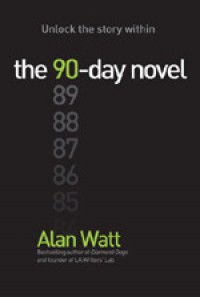 It had interesting exercises, but I didn't really like any of them and didn't feel half of them helped me actually move forward with the story. I didn't find them helpful at all (well, maybe one or two), and it just seems like it'll lead you to a very formulaic novel (even if at its very core every novel is formulaic, as it follows a beginning, middle and end, after all).
It had interesting exercises, but I didn't really like any of them and didn't feel half of them helped me actually move forward with the story. I didn't find them helpful at all (well, maybe one or two), and it just seems like it'll lead you to a very formulaic novel (even if at its very core every novel is formulaic, as it follows a beginning, middle and end, after all).Also the basic tips it gives behind all the exercises and rambling are pretty obvious tips.
This might work for some people, but it's not working out for me.
It might also work if all you want to do is get down on paper a novel or that first novel because you're terribly blocked or it's your very first and you're super nervous... but that's about it.
The 7 Points of Write: An Essential Guide to Mastering the Art of Storytelling, Developing Strong Characters, and Setting Memorable Scenes
 I liked the worksheets, thought they weren't really anything out of this world. The rest was... average.
I liked the worksheets, thought they weren't really anything out of this world. The rest was... average.
100 Things Every Writer Needs to Know
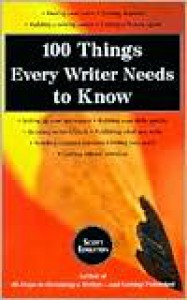 Good, but very basic and slightly outdated.
Good, but very basic and slightly outdated. Spans through a variety of topics, from how to start, to how to actually write, to publishing and how to make money off your writing.
It had some interesting points of reference (like the section on terminology, or #44 and #82), but still brought nothing new to the table. Recommended for someone just getting into writing and who doesn't know much about the subject at all, but if you are already pretty familiar with writing, I'd give it a pass.
Minimalism: How to Become a Minimalist (Illustrated With Bad Drawings)
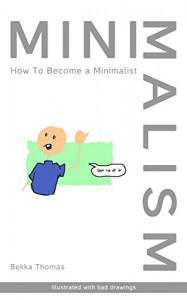 It was an alright book. I appreciate that the author told a bit of her story and how it led her to minimalism, which was interesting, but it felt a bit TMI/Why-do-I-want-to-know-this at times and dragged on. Not that I don't sympathize, but just... it was not what I thought I'd get when I grabbed the book.
It was an alright book. I appreciate that the author told a bit of her story and how it led her to minimalism, which was interesting, but it felt a bit TMI/Why-do-I-want-to-know-this at times and dragged on. Not that I don't sympathize, but just... it was not what I thought I'd get when I grabbed the book.It had some basic tips/ideas/reasoning for getting rid of things and getting into minimalism, but it wasn't really something I would have titled "How to become a minimalist"; more like "How I became a minimalist", which is an entirely different category.
The first title makes you go into reading it expecting less life story and more help with the how-to, the latter tells you there's more story besides the possible tips and, for me at least, needed a different mind-frame for reading. The book was in the latter category, and I felt just a little mislead/cheated by the title.
Still, if you're overwhelmed by stuff and new to minimalism, it's not a bad read.
The Emotion Thesaurus: A Writer's Guide to Character Expression
 A reference book for "show, don't tell" emotions. It's a real gem (even if these are all basic things anyone with basic observant skills should probably know), because even if you know these things sometimes you get stuck when trying to describe them (or don't want to repeat yourself) and this book is really helpful for that.
A reference book for "show, don't tell" emotions. It's a real gem (even if these are all basic things anyone with basic observant skills should probably know), because even if you know these things sometimes you get stuck when trying to describe them (or don't want to repeat yourself) and this book is really helpful for that.
The First Five Pages: A Writer's Guide To Staying Out of the Rejection Pile
 Reviewer Kelly H.</> said it better.
Reviewer Kelly H.</> said it better. This book, for some odd reason, totally pissed me off. I think it was the way it was written, it sounded almost condescending at times. I couldn't get too far in it at all.
Writing Habit Mastery - How to Write 2,000 Words a Day and Forever Cure Writer’s Block
 Great tips, but sadly nothing new under the sun, as most things said here you can find in just about any blog, for free. It's a to-the-point book, though, and tries not to beat around the bush on the explanations of the tips and tactics, so that's nice. A good read if you need to be reminded to just sit and write.
Great tips, but sadly nothing new under the sun, as most things said here you can find in just about any blog, for free. It's a to-the-point book, though, and tries not to beat around the bush on the explanations of the tips and tactics, so that's nice. A good read if you need to be reminded to just sit and write.I particularly enjoyed the section on outlining.
2k to 10k: Writing Faster, Writing Better, and Writing More of What You Love
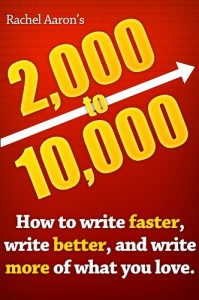 This book was rather disappointing. It's not that I didn't enjoy it, it's just that it wasn't great, and I happened to expect much more from the other reviews and comments on it.
This book was rather disappointing. It's not that I didn't enjoy it, it's just that it wasn't great, and I happened to expect much more from the other reviews and comments on it. The book is divided in two parts, the first of which actually tells you how she upped her word count, the second of which is more of a detail of her writing process than actual upping word count (sure, it's related, but meh).
While reading the process of writing was interesting, it was also rather boring. Neither part brought much new to the table that someone who's been reading "How to write" books or blogs for a while now wouldn't know.
Also, several misspellings and wrong words throughout the book. Could have used more careful editing, you know, being a book about writing and all.
I have to say, I enjoyed the to-the-point approach of [b:Writing Habit Mastery - How to Write 2,000 Words a Day and Forever Cure Writer’s Block|18478318|Writing Habit Mastery - How to Write 2,000 Words a Day and Forever Cure Writer’s Block|S.J. Scott|https://d.gr-assets.com/books/1385184701s/18478318.jpg|26150466] more as it had no life story to push it through. But I liked that [b:2k to 10k: Writing Faster, Writing Better, and Writing More of What You Love|16080676|2k to 10k Writing Faster, Writing Better, and Writing More of What You Love|Rachel Aaron|https://d.gr-assets.com/books/1349974760s/16080676.jpg|21879311] had a few examples of the author's work, and some back story doesn't hurt, sometimes.
The Death Cure
 And then no one asked the right questions and the explanations we did get made no sense (well, they made sense, they were just silly). The End. What do you mean there's more books? I thought this was a trilogy? D: I'll pass, I barely made it this far.
And then no one asked the right questions and the explanations we did get made no sense (well, they made sense, they were just silly). The End. What do you mean there's more books? I thought this was a trilogy? D: I'll pass, I barely made it this far.
The Scorch Trials
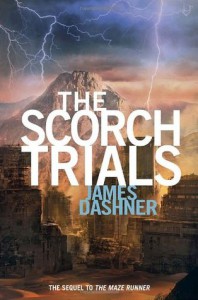 1.5ish, but I'll be generous and round it on a 2. I mean, I didn't entirely hate it, but it was not at all good.
1.5ish, but I'll be generous and round it on a 2. I mean, I didn't entirely hate it, but it was not at all good. So far my impression is: WICKED is completely stupid. Thomas is completely stupid. Teresa is completely stupid. The others aren't overly bright either, but at least they try. Or tried... not a lot of effort put into this second part in my opinion, character wise (even less than on the first). I haven't the foggiest whose bright idea it was to pick Thomas as any kind of "intelligent" kid, or as "a leader", or anything else of the sort, he's the one with the least sense in the lot. And that's all I'm going to say because that whole thing was kind of predictable and really, really... not good.
That love triangle thing? Just ridiculous, and since I feel even less for the characters in this book than I did in the previous one, you can guess I don't really care that poor Thomas' heart was broken (boo-hoo).
Anyway, not overly happy with this book (but will still read the next because, why not? I want to know what kind of weird reasoning they put behind all this).











